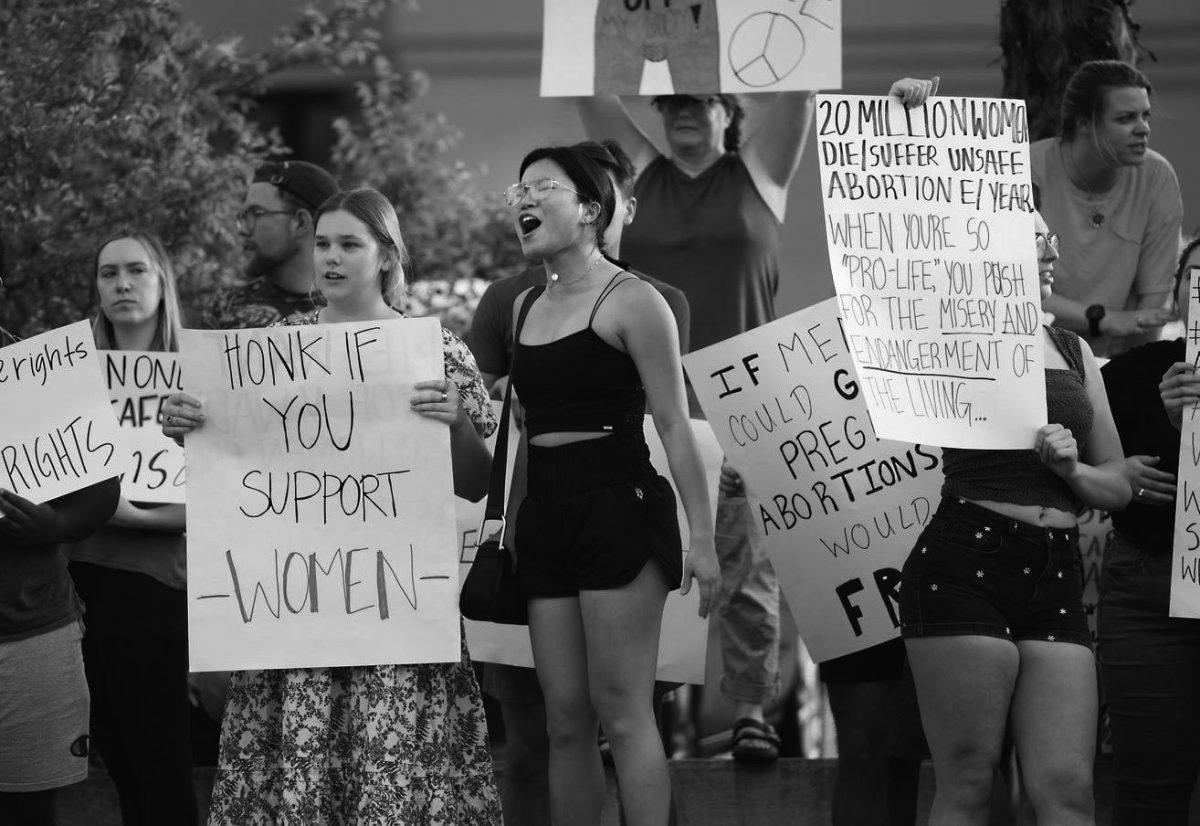Leaked documents
Regardless of religious beliefs or political affiliation, the recent events of the Supreme Court of the United States (SCOTUS) call for education. Particularly, education of sex and education of laws are of the utmost importance at this time in American history.
The Roe v. Wade (1973) was a landmark Supreme Court decision that favored an anonymous woman’s claim that laws restricting access to abortions was unconstitutional. The court ruled that intrinsic to the Due Process clause of the Fourteenth Amendment is a woman’s “right to privacy” pertaining to the ability to decide whether to have an abortion, and that the laws in question violated this right.
Another significant case, Planned Parenthood of Southeastern Pennsylvania v. Casey (1992), followed up on Roe by banning legislation that created an “undue burden” to women seeking an abortion.
Almost 50 years later, leaked documents suggest that these court rulings will be overturned by the SCOTUS.
Former Vice President Mike Pence described the leakage of the document as a betrayal. Unsure of the motives behind the action, he assured that it will not affect the outcome outlined within the draft opinion.
This document is representative of the majority opinion of the SCOTUS, meaning that more than half of the Supreme Court Justices agree with the sentiments outlined. It has claimed that the right to an abortion is not and should not be protected by the constitution in any regard.
“We hold that Roe and Casey must be overruled,” the document reads. “The Constitution makes no reference to abortion, and no such right is implicitly protected by any constitutional provision, including the one on which the defenders of Roe and Casey now chiefly rely – the Due Process Clause of the Fourteenth Amendment.”
The reasoning for this decision not following under that clause, as explained in the document, is that the Fourteenth Amendment has, since the 1997 Washington v. Glucksberg decision, been provisioned to only protect rights that are “deeply rooted in this Nation’s history and tradition” and “implicit in the concept of ordered liberty.”
On a technicality, the majority within the SCOTUS has decided that a federal right to abortion does not fall under this clause.
The document also explains that this is not the first time that this court decision has been under fire since the initial decision in 1973. This is, however, the first time that there appears to be solid agreement on the subject matter.
It is important to note that the leaked document was initially drafted in February 2022, according to POLITICO. Repercussions of this draft, if approved, would likely not go into effect immediately.
This is not the abolition of abortion in its entirety. It is transferring the right to make decisions on abortion laws back to the state.
South Carolina will feel some of the effects sooner than other states, though, due to the passing of the “Heartbeat Bill” in February 2021, declaring abortions after the detection of a heartbeat, consistently at 6 weeks of gestation, to be illegal.
Sex education is a pivotal point in America right now, as a protection to terminate a pregnancy medically and safely is under attack. Pregnancy prevention, therefore, is the most viable option to ensure that a woman does not have to follow through with an unwanted or unplanned pregnancy.
Offering an international perspective, Cecil Asimenu ’24 describes abortion laws in his home country of Ghana.
“Abortion becomes a criminal offense if the mother induces abortion with poison or other unprescribed drugs. It is also criminal if it’s performed by an unregistered medical practitioner,” Asimenu said. “So the intent of the Ghanaian law on abortion is to prevent as many unsafe abortions as possible.”
“However, the stigmatization of abortion, which is a product of misconceptions,” Asimenu continued, “prevents many women from taking advantage of abortion’s legal status in Ghana. These misconceptions are rooted in religious and cultural beliefs.”
Wofford resources
Here at Wofford, there are resources to ensure that, even if Roe v. Wade is overturned on a federal level, students are equipped to prevent unplanned pregnancies, helping to ensure that students never get to the point of needing an abortion.
As of now, the Wellness Center does not offer abortions, as that is not a procedure done on campus. They do offer numerous other resources, though, and can help a student find a local abortion clinic if they are in need.
The South Carolina Department of Health and Environmental Control has a local health department on E. Wood St., only about a five minute drive from Wofford. This location has the ability to assist students in receiving an abortion.
Furthermore, the use of contraceptives, although not 100% effective, is another way in which Wofford can assist its students in regard to family planning.
Campus Union’s Wellness and Safety Committee has established a partnership with a local nonprofit, Palmetto Care, to provide free, name-brand, male and female condoms to the Wofford community. These can be found in each resident hall’s laundry room and the Wellness Center.
They are accessible to everyone with no questions asked.
Palmetto Care also offers other resources for STI prevention, pregnancy prevention and general sex education for anyone who wants to seek more information. They are also located near Wofford’s campus, across the street from the Spinx in downtown Spartanburg.
A little known fact is that Wofford’s Wellness Center has the ability to prescribe birth control to its students. However, the College does not have a pharmacy to fill the prescription, which could be a potential added cost that students cannot afford.
In this case, the previously mentioned Health Department can provide birth control at a lower expense.
Many students may also be eligible to receive Family Planning healthcare, such as Medicaid. In the event that this is not possible, the Health Department via SCDHEC also offers pap smear exams, barrier contraceptives, laboratory and pregnancy testing, educational and counseling services, hormonal and non-hormonal contraceptives and more.
Planned Parenthood may also be another useful resource for students who find themselves away from campus yet still in need of services. They offer services such as abortions, examinations, preventative contraceptives, emergency contraceptives and more at low or no cost to patients. Their closest location to Wofford’s campus is in Columbia, South Carolina.
Regardless of the resources available, pregnancy is never 100% preventable for sexually active individuals. In the event that this is something of concern, it is important to note that the Wellness Center does offer pregnancy tests.
While they do not possess the radiological equipment necessary to perform ultrasounds, they do offer laboratorial tests for students.
However, even with all of the necessary resources to prevent pregnancy to the best of one’s ability, conception is still very possible, and students and alumni have taken to social media to express their thoughts and feelings on the matter of abortion potentially no longer being a safe and legal option.
“Overturning Roe v. Wade will not stop abortion,” said Ashton Walthall ‘25. “It will, however, criminalize safe and legal abortions that are currently constitutional rights given to women in this country.”
The same student went on to explain an alternative to overturning this court decision that will still prevent excessive abortions: sex education.
A pro-life alumnus, Eliza Metts ’21, also reiterated these ideas.
“It’s time for us all, whether identifying as pro-life or pro-choice, to work together to help women in a post-Roe v. Wade world,” Metts stated. “It’s time to provide all the more care for women who need communal support in their time of great need.”
Protests & Politics
Along with the many debates occurring with and surrounding the SCOTUS, a local organization, the Carolina Pregnancy Center, hosted a gala in the Spartanburg Memorial Auditorium on Thursday, May 5.
Students were divided on the opinions of this event, with many curating a protest outside and others purchasing tickets to attend.
Wofford and USC Upstate students collectively protested the event. Dahlia Cutler ’23 was responsible for organizing the efforts on Wofford’s campus.
“Tonight’s protest had a huge turnout packed with contagious passion and enthusiasm. There was a huge group of Wofford students as well as members from the surrounding Spartanburg community,” said Cutler, “and I left feeling so grateful and inspired by all our voices.”
“We’re fighting for the government to stop policing our bodies and taking away our freedom of autonomy over our own skin,” Cutler continued. “Women have been targeted by our systematically patriarchal governments, and that is why we are coming together to let our voices be heard, so that we can see the change that so desperately needs to happen.”
Former Vice President Mike Pence was the keynote speaker of the evening, offering his congratulations to the achievements of the Center and expressing opinions he holds on the recent events in America, including the Roe v. Wade decision.
“Roe must go,” Pence stated.
Anne Darby Keating ’22 offered pro-life sentiments as well.
“I don’t believe the constitution in any way allows anyone to kill someone else. Abortion first and foremost takes another’s life,” Keating said. “While there are lots of issues with foster care, healthcare, rape, incest, etc. that need to be fixed in this country, lives should not be sacrificed while we are fixing these issues. Life is precious.”
However, despite the politics surrounding the event, the Carolina Pregnancy Center makes a positive impact as a place that assists mothers in making these pivotal decisions in life.
Their website outlines the various types of abortions that are available depending on how far along a woman is in her pregnancy. They also outline the pre-abortion requirements, such as a pregnancy test and ultrasound, and offer both at no cost. Part of this is a newly-obtained mobile sonogram van.
If the parents decide to keep the baby, they also have a program called “Earn While You Learn (EWYL)” in which the parents can attend classes, go to counseling, etc. to earn “points” that they can trade in for free goods. This includes everything from diapers and wipes to strollers and cribs.
Concluding these events
Regardless of the results of this pending court decision and the opinion that one holds on abortions, it is important that the Wofford community not engage itself in hate speech, unruly behavior or anything of the sorts.
In general, both sides of the debate could do more. The pro-life argument needs more to offer in terms of post-birth resources. The pro-choice argument needs more resources in terms of pre-conception resources.
This is not an issue that will be fixed in any regard by deciding to uphold or overturn Roe v. Wade. This is an issue with deeper roots than the decision made on Jan. 22, 1973.































